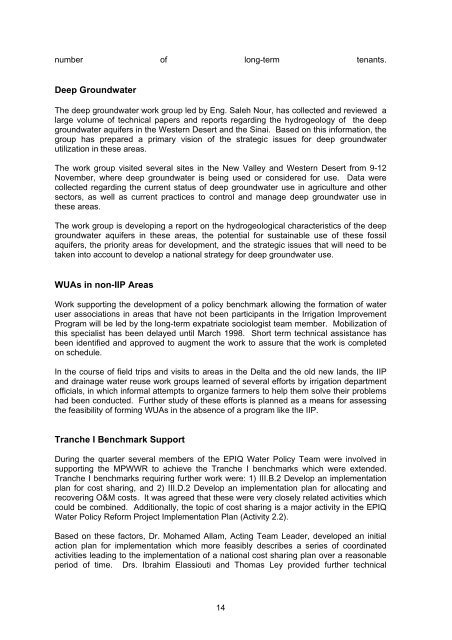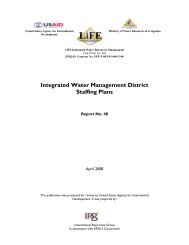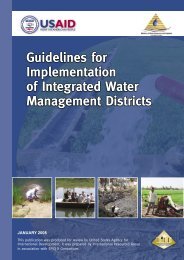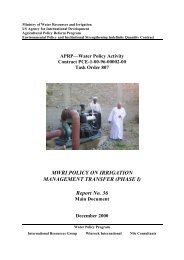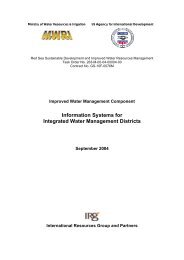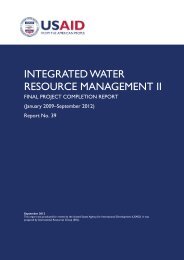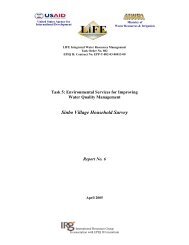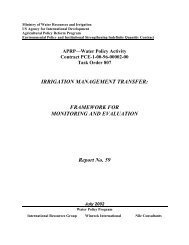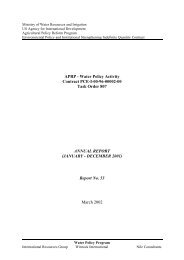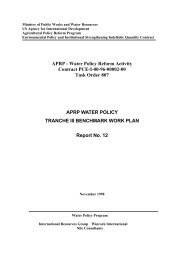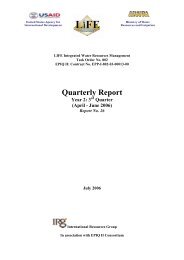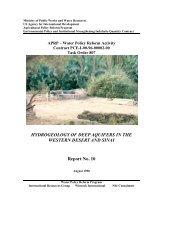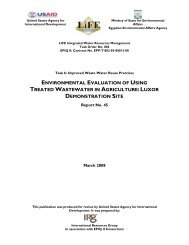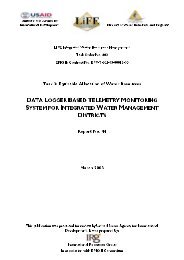APRP - Water Policy Reform - LIFE-IWRMII Project, Egypt
APRP - Water Policy Reform - LIFE-IWRMII Project, Egypt
APRP - Water Policy Reform - LIFE-IWRMII Project, Egypt
- No tags were found...
You also want an ePaper? Increase the reach of your titles
YUMPU automatically turns print PDFs into web optimized ePapers that Google loves.
number of long-term tenants.Deep GroundwaterThe deep groundwater work group led by Eng. Saleh Nour, has collected and reviewed alarge volume of technical papers and reports regarding the hydrogeology of the deepgroundwater aquifers in the Western Desert and the Sinai. Based on this information, thegroup has prepared a primary vision of the strategic issues for deep groundwaterutilization in these areas.The work group visited several sites in the New Valley and Western Desert from 9-12November, where deep groundwater is being used or considered for use. Data werecollected regarding the current status of deep groundwater use in agriculture and othersectors, as well as current practices to control and manage deep groundwater use inthese areas.The work group is developing a report on the hydrogeological characteristics of the deepgroundwater aquifers in these areas, the potential for sustainable use of these fossilaquifers, the priority areas for development, and the strategic issues that will need to betaken into account to develop a national strategy for deep groundwater use.WUAs in non-IIP AreasWork supporting the development of a policy benchmark allowing the formation of wateruser associations in areas that have not been participants in the Irrigation ImprovementProgram will be led by the long-term expatriate sociologist team member. Mobilization ofthis specialist has been delayed until March 1998. Short term technical assistance hasbeen identified and approved to augment the work to assure that the work is completedon schedule.In the course of field trips and visits to areas in the Delta and the old new lands, the IIPand drainage water reuse work groups learned of several efforts by irrigation departmentofficials, in which informal attempts to organize farmers to help them solve their problemshad been conducted. Further study of these efforts is planned as a means for assessingthe feasibility of forming WUAs in the absence of a program like the IIP.Tranche I Benchmark SupportDuring the quarter several members of the EPIQ <strong>Water</strong> <strong>Policy</strong> Team were involved insupporting the MPWWR to achieve the Tranche I benchmarks which were extended.Tranche I benchmarks requiring further work were: 1) III.B.2 Develop an implementationplan for cost sharing, and 2) III.D.2 Develop an implementation plan for allocating andrecovering O&M costs. It was agreed that these were very closely related activities whichcould be combined. Additionally, the topic of cost sharing is a major activity in the EPIQ<strong>Water</strong> <strong>Policy</strong> <strong>Reform</strong> <strong>Project</strong> Implementation Plan (Activity 2.2).Based on these factors, Dr. Mohamed Allam, Acting Team Leader, developed an initialaction plan for implementation which more feasibly describes a series of coordinatedactivities leading to the implementation of a national cost sharing plan over a reasonableperiod of time. Drs. Ibrahim Elassiouti and Thomas Ley provided further technical14


